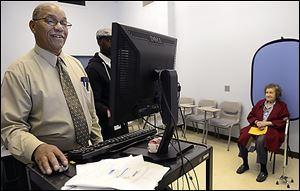
Pa. voters won’t need to show photo ID
10/3/2012
Joseph Strickland prepares voter identification for Sophie Masloff, 94, of Squirrel Hill, Pa., the former mayor of Pittsburgh. The state's debate over voting rights is on hold with a judge’s decision just weeks before the presidential election.
HARRISBURG, Pa. — Pennsylvania voters will be allowed to cast regular ballots without showing photo identification next month under a Commonwealth Court decision issued Tuesday.
After surviving Democratic opposition in the Legislature and the earlier stages of a legal challenge, the state’s new voter identification law was stripped of its teeth five weeks before Election Day. Judge Robert Simpson, asked by the Pennsylvania Supreme Court to reconsider his August decision stopping the law, on Tuesday barred the state from requiring voters without acceptable identification to vote by a provisional ballot in November.
Those provisional ballots would count only if they later verified their identities.
He wrote that his injunction would have the effect of extending through the general election a transition period in which voters may be asked for identification but could vote without it. The order allows a continuation of advertising the identification requirement while calling for a trial on the question of permanently stopping the law.
“Basically we’re in a holding pattern,” said Ken Gormley, dean of the Duquesne University School of Law.
“He is not telling the state that they have to halt their educational efforts, and he’s not prohibiting election officials from asking for ID. But the bottom line is that regardless of what ID anyone presents, they’re going to be able to vote just as they have in the past.”
Gov. Tom Corbett, who signed the voter identification measure into law in March, said he had not decided if he would appeal the injunction for the November election but suggested the administration would not.
“As it comes to a preliminary injunction, no final decision has been made,” he said. “But you can see where we’re probably leaning.”
The governor’s spokesman, Kevin Harley, said he was referring to a decision not to appeal the ruling.
In its order to reconsider the law, the Supreme Court focused on problems implementing the requirement before the election. Judge Simpson wrote he had expected the state to issue more new driver licenses and photo identification cards than it has since the law took effect.
“For this reason, I accept petitioners’ argument that in the remaining five weeks before the general election, the gap between the photo IDs issued and the estimated need will not be closed,” he wrote.
The decision meant a change in plans for voting officials in Allegheny County, where the elections division had just hours to revise instructions for an early afternoon voter identification training session for election judges and inspectors.
County Executive Rich Fitzgerald said Allegheny County Community College branches will cease issuing photo IDs they had begun dispensing to eligible voters.
Attorneys who challenged the law celebrated the decision letting voters without acceptable ID vote with regular ballots, rather than, as the judge had suggested during the hearing, some form of provisional ballot.
“Voters who don’t have ID on Election Day will be able to vote with a regular ballot as opposed to a provisional ballot,” said Witold Walczak, legal director of the American Civil Liberties Union of Pennsylvania. “We actually think that’s a huge victory.”
But the law’s opponents cautioned the judge’s decision to let the state to keep advertising about the photo identification requirement could confuse voters about what is required.
David Gersch, an attorney with the challengers, said they would discuss the educational campaign with the administration.
“We like to think at the end of the day they’re not going to be interested in having ads and educational materials out there that are incorrect,” he said.
The Block News Alliance consists of The Blade and the Pittsburgh Post-Gazette. Karen Langley is a reporter for the Post-Gazette.
Contact Karen Langley at klangley@post-gazette.com, or 1-717-787-2141.